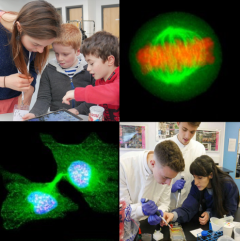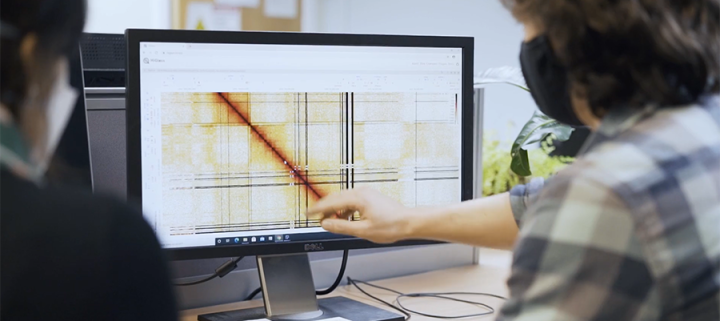Programme structure
The iCM PhD programme provides comprehensive technical and professional training.
The iCM PhD programme provides a variety of technical and professional training, to prepare students for diverse scientific careers.
In their first year students will undertake introductory core learning modules and rotation projects allowing them to make informed choices for their main PhD project.

Rotation projects
Students will choose from the projects on offer for the full PhD and carry out three lab based rotation projects. During each rotation students will write a News and Views article about the project and at the end of the rotation they will present their research to the host labs and the iCM Team.
Training courses
Emphasis will be placed on timely skill development with the majority of core skills training taking place during the first year of study.
Core learning modules will cover four key areas:
- best research practice,
- technical skills,
- presentation skills and personal and
- Professional development.
The core learning modules will include technique workshops and training in critical thinking via interactive tutorial-style courses led by programme supervisors. Further training needs will be identified through Personal Learning and Career Development plans and bespoke training will be tailored to individual needs and delivered throughout the PhD at a time that is appropriate to the individual.
Research projects

Full time PhD research projects start at the end of March of the first year and will be conducted in a research group that hosted one of the rotation projects.
Students will be primarily embedded in research groups with a strong track record in dissecting cellular mechanisms ranging from:
- anti-microbial resistance,
- stochastic heterogeneity,
- epigenetic and chromatin-based regulation,
- control of gene expression,
- non-coding RNA and RNA processing,
- chromosome structure and segregation,
- cell-cycle and
- cell growth regulation.
All PhD projects are collaborative between two supervisors who have complementary expertise: one in cell mechanisms and one in quantitative skills.
The definition of ‘quantitative skills’ is broad and includes Computational Data Sciences, Mathematics, Biophysics, Structural Biology, Chemical Biology and Biomaterials. By integrating these different areas into collaborative cross-disciplinary projects we will break new ground in understanding cellular mechanisms pertinent to the biomedical arena.
These projects are currently on offer for the 2023 cohort, the supervisor pairs offering projects changes each year.
Projects for 2024 will be decided in August 2024.
| Cell Mechanism Supervisor | Quantitative Supervisor | Project Titles |
|---|---|---|
| Matthew Swaffer | Ramon Grima | Investigating the molecular basis to how cell size impacts cell function. |
| Ian Adams | Owen Davies | Uncovering the mechanistic relationship between recombination and chromosome synapsis in mammalian meiosis. |
| Jelena Baranova | Mathew Horrocks | Shining a light on the structure of the brain using super-resolution microscopy |
| Adele Marston | Chris Brackley | Principles of functional genome organisation in meiosis |
| Sara Buonomo | Marcus Wilson | Quantitative approaches to investigate RIF1 recruitment to heterochromatin |
| Sander Granneman | Georg Kustatscher | Deciphering the mechanisms controlling temporal regulation of RNA decay in MRSA during host adaptation. |
| Hiro Ohkura | Wilson Poon | Biology and physics and of the spindle matrix |
| Julie Welburn | Alison Hulme | Identification of kinase-phosphatase mitotic substrates using chemical and light-activated crosslinking |
| Bungo Akiyoshi | Chris Wood | Discover the mechanism of how trypanosomes epigenetically assemble unconventional kinetochores at centromeres |
| Andrew Jackson | Jeyaprakash Arulanandam | Defining the molecular mechanisms for TRAIP as a mitotic regulator |
| Dhanya Cheerambathur | Andrew Goryachev | Investigating the Role of Rho GTPases in Dendrite Patterning |
| Eric Schirmer | Davide Marenduzzo | Curing AIDS through reservoir depletion by understanding latency in context of the interplay between genome organisation and integration |
| Nadanai Laohakunakorn | Davide Michieletto | Transcriptional condensates: understanding and controlling the viscoelasticity of fluids undergoing DNA transcription |
| Liz Bayne | Cei Abreu-Goodger | RNA interference in the human fungal pathogen Cryptococcus |
| Ken Sawin | David Tollervey | Stress responses in filamentous fungi. |
| Lynne Regan | Diego Oyarzun | Engineering the Ubiquitin-Protease System as a novel route to target fungal pathogen effector proteins for degradation – an alternative to chemical fungicides |
| Peter Swain | Filippo Menolascina | Determining how cells match levels of ribosomes with demand. |
| Edward Wallace | Atlanta Cook | Investigating the mechanisms of a post-transcriptional pathway that controls fungal growth. |
How to Apply
PhD Programme Administration
- Four Year PhD Programme in Integrative Cell Mechanisms
- Wellcome Centre for Cell Biology
Contact details
- Email: phd.wcb@ed.ac.uk
Address
- Street
Michael Swann Building
Max Born Crescent- City
- Edinburgh
- Post Code
- EH9 3BF

